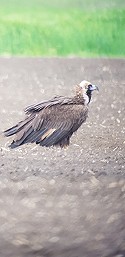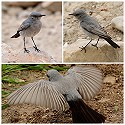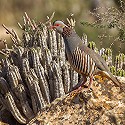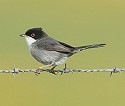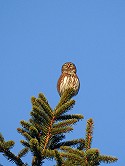Sitta ledanti 21
Selma Benziada, Jihel, Algeria ·
Max Berlijn
In het kielzog van deze "twitch" hebben we met BirdQuest een bezoek gebracht aan twee locaties voor de Algerijnse Boomklever in Algerije. We hadden op twee plekken vogels verdeeld over twee dagen. Hierbij twee plaatjes van een minder bekende locatie. We hadden besloten om dit niet via het inmiddels gebaande pad in Constantine te doen maar alles vanuit Tunesië aan te vliegen. Voordeel is dat je nog wat andere leuke soorten daar kan bezoeken, en je logistiek niets te maken hebt met Algerijnse vliegvelden. In tijd scheelt het allemaal niet veel. Alle wenssoorten lukte (ook een zichtwaarneming van de Mauritanica Bosuil). We hadden echter wel te maken met een scherpe bewaking overdag (soms wel 8 bewapende Gendarmes op respectabele afstand in het bos) en ook op de reis over de wegen er naar toe hadden we een politie auto voor en achter de bus. Tevens redelijk wat militaire roadblocks. Uitstapjes buiten de vooraf gecommuniceerde itenerary werden niet gewaardeerd door de autoriteiten. Ik/We voelde ons niet onveilig maar het is wel een aparte manier van vogelen, ook nog eens met geleende kijkers.
Aegypius monachus 8
Duitsland ·
Hans Pohlmann
Dit is Brinzola. Deze Monniksgier is een in 2016 wildgeboren vogel (locatie van nest natuurlijk onbekend). De vogel werd verzwakt gevonden in de buurt van Palencia en is opgelapt in een rehabilitatiecentrum in Valladolid (afstand van ca. 75 km). Daar heeft ze tot begin 2018 doorgebracht. De laatste 9 maanden van haar gevangenschap heeft ze doorgebracht in een uitwilderingskooi in de Sierra de la Demanda (wat op circa 175 km van Palencia ligt). Ze werd daar op 7 oktober 2018 losgelaten in het kader van een project om meerdere Monniksgier kolonies met elkaar te verbinden (als een soort van missing link dus). In die (ruime) omgeving vloog ze sindsdien. Op 22 april besloot ze haar partner achter zich te laten en begon noordwaarts te vliegen. Eerst van west naar oost de Pyreneeën over, dan noordwaarts om uiteindelijk op 8 mei België te bereiken.
Op 9 mei vloog ze Nederland in. Ze passeerde de grens, vloog vervolgens via Luyksgestel en Bergeijk onder Eindhoven door (grofweg over Valkenswaard), stukje zuidelijker richting Budel (rond 17.00) en vervolgens weer in noordoostelijke richting over de Maas, om uiteindelijk ter hoogte van Roermond Duitsland in te vliegen. Daar vloog ze nog ruim 100 km door in noord-oostelijke richting.
De laatste locatiegegevens waren van 19.05 uur gisteravond. In die omgeving heb ik vanaf vanochtend vroeg gezocht voordat om 9.05 uur de volgende locatie kwam. Ze bleek nog 8 km verderop te zitten. Daar trof ik haar vanochtend op een akker.
Ter verduidelijking: ik krijg deze gegevens vanwege mijn plek in de Management Board van de Vulture Conservation Foundation. Ik krijg ze om te beoordelen of de vogel nog gezond en sterk is of dat er eventueel ingegrepen moet worden. Dat is dan ook het doel van het bezoekje. Ik krijg deze gegevens in vertrouwen en dat zal ik niet beschamen. Natuurlijk ben ik ook een vogelaar en beoordeel ik of het mogelijk is de locatie vrij te geven, zodat mensen de vogel ook kunnen zien zonder de vogel (die linksom of rechtsom toch wat verzwakt zal zijn) te verstoren. Als dat kan zal ik dat zeker organiseren. Het bezoeken was op deze plek vanochtend echter niet mogelijk. Rond 11 uur vloog de vogel op, won snel hoogte en verdween in noordoostelijke richting achter de bosrand.
Strix hadorami 1
Wadi ElGemal , Red Sea , Egypt ·
Watter AlBahry
this observation in collaboration with Alexandre Leitão
Certhia brachydactyla dorotheae 7
Cyprus, Troodos Mountains ·
David Spelt
Erg afwijkend zangrepertoire en vrij lastig om een vogel goed in beeld te krijgen.
Periparus ater cypriotes
Cyprus, Troodos Mountains ·
David Spelt
Markante vogels met erg weinig wit op de wangen en veel verder doorlopend zwart. Algemeen bovenop de berg.
Loxia curvirostra guillemardi
Cyprus, Troodos Mountains ·
David Spelt
Targets in de Troodos mountains waren de 4 ondersoorten van Boomkruiper, Zwarte Mees, Gaai en Kruisbek. Deze allemaal goed kunnen zien op de Artemis trail. Leuke loop trail op zo'n 1800m hoogte met nog best veel sneeuw. Kruisbek bleek hier vrij eenvoudig met meerdere waarnemingen.
Sylvia melanothorax 1
Cyprus, Anarita Park ·
David Spelt
Slechts een paar goede zichtwaarnemingen van deze soort. Deze soort schijnt te worden verdrongen door de op het eiland flink in opmars zijnde Kleine Zwartkop.
Otus cyprius 40
Cyprus, Mavrokolympos ·
David Spelt
Zeker 4 ex te horen direct net na zonsondergang op de bekende plek. Op andere plaatsen ook een aantal keer gewoon overdag roepend.
Lanius senator badius
Ajaccio, Corsica ·
Han Buckx
Zingend ! De enige tijdens de trip; blijkbaar nog niet allemaal terug begin april.
Sitta whiteheadi
Corte, Corsica ·
Han Buckx
Boven de 1000 meter makkelijk te doen; omgeving Corte prima plek voor deze endeem.
Tichodroma muraria 1
Kazbegi, Georgië ·
René van Rossum
Bij Kazbegi, Georgië zagen we iedere dag 3 Rotskruipers nabij de rivier de Terek aan de noordzijde van het dorp.
Carpodacus rubicilla
Kazbegi, Georgië ·
René van Rossum
Melanocorypha calandra
Georgië ·
René van Rossum
Zo dichtbij we ze hadden op de steppegebieden in Georgië, zo ver weg had ik 'm bij Goedereede.
Groepen van 100-en en soms op een paar meter naast de auto in Georgië. Maar die van Nederland was natuurlijk het leukst !
Phoenicurus erythrogastrus 6
Kazbegi, Georgië ·
René van Rossum
Ten noorden van Kazbegi liepen er, voordat het twee dagen erna hevig ging sneeuwen, zo'n 50-60 exemplaren gewoon als Tapuiten te foerageren. Opvallend was dat er veel meer mannetjes dan vrouwtjes waren. Maar later vonden we ook in het dorp achter ons hotel (Alpenhaus) een aantal Witkruinroodstaarten.
Veel meer foto's zijn te zien op Observation.org
Phoenicurus erythrogastrus 3
Kazbegi, Georgië ·
René van Rossum
Ten noorden van Kazbegi liepen er, voordat het twee dagen erna hevig ging sneeuwen, zo'n 50-60 exemplaren gewoon als Tapuiten te foerageren. Opvallend was dat er veel meer mannetjes dan vrouwtjes waren. Maar later vonden we ook in het dorp achter ons hotel (Alpenhaus) een aantal Witkruinroodstaarten. Op deze foto zitten er wel een paar vrouwtjes tussen. En soms kwam er ineens een Gekraagde Roodstaart en een Oosterse Zwarte Roodstaart tussen zitten die een heel stuk kleiner zijn. Veel meer foto's zijn te zien op Observation.org
Sylvia subalpina 13
Boca di Serchio, Italië ·
Peter Adriaens
Er waren nog geen foto's van deze soort in de DB-galerij, zag ik.
Oenanthe melanura
Ein Gedi - Israel - 17 april 2019 ·
Jaap v.d. Marel
Ter plaatse ook de Waaierstaartraaf waargenomen.
Sylvia balearica 3
Mallorca ·
Eduard Sangster
Standvogel op Ibiza en Mallorca. Door de harde wind was het nog een uitdaging om deze soort te vinden.
Zo'n grijze borst en buik zou je eerder bij een Sardijnse verwachten. De zang en lichte keel waren wel zoals je verwacht bij een Baleaar.
Loxia curvirostra balearica 12
Mallorca ·
Eduard Sangster
Een zeer licht/vaal vrouwtje, voor zover ik kan vinden niet kenmerkend voor dit taxon, dat genetisch fors verschilt (net als het Atlas taxon) van de andere ssp. Talrijk in geschikt habitat op Mallorca.
Lanius senator badius
Mallorca ·
Eduard Sangster
De (ivm de nominaat) smallere zwarte voorhoofdband, ontbreken van witte handpenvlek en forse snavel zijn goed te zien. De brede witte randen aan de vleugel duiden op een 2e jaars vogel. De grijze mantel is ook nog niet uitgekleurd zwart.
Phoenicurus erythrogastrus 9
Kazbegi, Georgië ·
René van Rossum
Hoofddoel was deze gave soort en dat is ook meer dan gelukt (dit is nog maar een screenshot). We hadden er gister zo’n 50-60 iets ten noorden van Kazbegi waar ze gewoon in groepjes van 20 bij elkaar op het gras liepen als Tapuiten. Niet normaal meer zo gaaf ! Zal bij thuiskomt wat uploaden. Hier ook elke dag 3 Rotskruipers die ook meer dan briljant in vlucht zijn gefotografeerd !!! Roodvoorhoofdkanarie, Lammergier, 10 Grote Roodmussen, Turkse Fraters, Kaukasische Korhoen en -Berghoen. Kortom helemaal geweldig hier !
Caprimulgus aegyptius
Merzouga, Morocco ·
Han Zevenhuizen
Another most-wanted during our Morocco birding trip.
Eremalauda dunni 3
Merzouga, Marocco ·
Han Zevenhuizen
Three birds in total were present in the desert close to hotel Jasmina (Merzouga area) and were discovered earlier that day by Cristian Jensen / Audouin Birding. A most welcome and unexpected species on our trip, causing a high-speed twitch just before sunset!
Apparently this species was not seen in this area since 2012. The African Dunn's on the picture shows a rather pale bird compared to what you may find in literature (e.g. Collins) and on photos.
Otis tarda
Villafáfila, Spanje ·
Marc Argeloo
tripje langs memory lane, interessant biotoop, 30+ jaar geleden voor het eerst geweest, had toen nog flinke cowboytrekken om daar rond te rijden, nu bestaat het 32000ha grote reservaat uit nog meer landbouwgrond (minstens 70%) , met een bezoekerscentrum waar een kunstmatig meertje is aangelegd waar je meerkoeten kunt aaien, combineerde Villafáfila met Azud de Riolobos (80 km ten Z van Villafáfila), zelfde verhaal: witbuikzandhoen 0, zwartbuikzandhoen 0, kleine trap 0, griel 0, zullen er vast nog zitten, maar beeld was ronduit dramatisch, laatste twee soorten mogelijk nog niet optimaal tp, grote trap lijkt nu kwa biotoop de grutto van Spanje te worden
Otus brucei 2
Qalya Date Plantation ·
David Uit de Weerd
Een baggerfoto, maar...
Enige jaren geleden stond er in de Dubi een baanbrekend artikel over Gestreepte Dwergooruilen in dadelplantages ten noorden van de Dode Zee. Ze zijn prima te doen vanuit Israël. Drie uur rijden vanuit Eilat, mooi te combineren met een dag rondom Dode Zee-regio en een bezoek aan bijv. Arabische Zwartkop en Har Amasa (Roodstaarttapuit, Finsch Tapuit).
Wij hadden meerdere exemplaren in een dadelplantage juist ten noorden van de plantage die in de Dubi stond. Roepend boven ons hoofd, jagend voor de auto.
Corvus corax
Teno massif, Tenerife (Canary Islands) ·
Rubén Barone
Adult bird in its breeding territory. Northern Raven is an endangered species in the Canary Islands, but fortunately it is recovering in many islands. The subspecies present in the archipelago is Corvus corax canariensis.
Corvus corax
Teno massif, Tenerife (Canary Islands) ·
Rubén Barone
Adult bird in its breeding territory. Northern Raven is an endangered species in the Canary Islands, but fortunately it is recovering in many islands. The subspecies present in the archipelago is Corvus corax canariensis.
Sylvia communis 1
Al Mughsayl,Dhofar,Oman ·
Ben de Kruijff
Voor de liefhebbers. Deze opvallende Sylvia zat op een berghelling in een losse groep oostelijke grasmussen. Ik kom er niet goed uit en heb de foto aan diverse specialisten voorgelegd die tegenstrijdige opinies hebben. Volgens de Oman specialist Jens Eriksen is een oostelijke grasmus het meest aannemelijk. Ik denk dat hij gelijk heeft maar ik zou graag de mening van meer mensen horen.
Acrocephalus brevipennis
Barragem de Faveta, Santiago, Kaapverdië ·
Daan Drukker
Leuke endeem tijdens vakantie met mijn ouders. Alle terrestrische taxa waren goed te doen, maar door de ruige passaat waren de zeevogels toch lastiger. Helaas de kleine pijl en het stormvogeltje gemist, maar dat werd toch ruimschoots gecompenseerd door de gon-gons.
Pterocles exustus
Hilf,Masirah Island,Oman ·
Ben de Kruijff
Ongeveer 60 komen drinken bij de uitlaat van de waterzuiveringsinstallatie
Eudynamys scolopaceus
Hilf, Masirah Islannd,Oman ·
Ben de Kruijff
In de bosjes bij de waterzuivering 4 mannetjes bij elkaar, vorige jaren daar ook gezien.
Larus ichthyaetus 7
Sur,Oman ·
Ben de Kruijff
Tientallen hier aanwezig met ook 12 krabplevieren.
Sylvia leucomelaena 4
Ayn Hamran, Oman ·
Ben de Kruijff
Sylvia leucomelaena 5
Ayn Hamran, Oman ·
Ben de Kruijff
Zit daar best vaak.
Passer simplex 1
Merzouga, Marokko ·
Lodewijk Ouwens
Vorige week nog vier paar gevonden in desert camp buiten Merzouga.
Maar ook hier al twee paar Huismus...
Sylvia leucomelaena 2
Oman - wadi Ayn Hamran ·
Guus Jenniskens
ssp. leucomelaena. Een buitenkansje om deze normaal gesproken zeer skulky soort op deze wijze te kunnen zien.
Fringilla teydea 1
Tenerife, Las Lajas ·
Jorrit Vlot
Tijdens een tripje met familie. Met een paar nieuwe soorten en een vermakelijk walvis/dolfijnentripje een leuke bestemming voor een weekje.
De Blauwe Vinken waren goed te combineren met een BBQ op de picknickplaats Las Lajas.
Sylvia nana
Sun farm,Oman ·
Ben de Kruijff
Toch nog ongeveer 10 ex te vinden in de noordkant van de nu niet meer operationele maar wel toegankelijke Sun farm bij Sohar in Oman. Heerlijke beesten vaak bij isabel- en woestijntapuiten.
Iduna rama 4
Liwa,Oman ·
Ben de Kruijff
Weer gelukt hem te vinden in de mangroves maar lijkt zeldzamer te worden.
Phylloscopus neglectus 2
Al Hajar bergen ,Oman ·
Ben de Kruijff
Een tiental gevonden in de hoog gelegen wadi's vaak met de woestijnbraamsluiper. Soms zingend en vaak roepend.
Galerida macrorhyncha 2
ouarzazate ·
Eduard Opperman
Makkelijk langs het stuwmeer op de bekende plek
Passer simplex 1
merzouga ·
Eduard Opperman
speciaal voor Chris, blijft toch één van de mooiere soorten van de WP voor mij
Tchagra senegalus 1
oued souss ·
Eduard Opperman
Blijft een mooie soort en al volop zingend aanwezig in februari
Alectoris barbara 2
oued souss ·
Eduard Opperman
eindelijk eens mooi kunnen fotograferen op reis naar marokko
Sylvia melanocephala
Giganta Ricefields, Porto Alto, Portugal ·
Ronald Messemaker
Blijven fraai die mannen kleine zwartkoppen. Vrij algemeen in de wegbermen van de rijstvelden.
Glaucidium passerinum 5
Föckinghausen, Sauerland, Duitsland ·
Jan Hein van Steenis
Eigenlijk was ik in deze plaats-met-een-geweldige-naam op zoek naar Ruigpootuil, maar die lukte natuurlijk niet. Gelukkig had ik binnen een half uurtje wel een Dwerguil gevonden.
Het is in NL nogal stil geworden rond deze soort(en): allemaal in Embargië, of zijn er echt geen meer?
Picus sharpei 1
Madrid ·
Enno Ebels
Afgelopen week in en rond Madrid vier exemplaren gezien en nog meer gehoord; de vogels in stadsparken lieten zich verreweg het beste bekijken - deze zat down-town op amper 100 m van het Plaza de España, in het uiterste puntje van het Parque del Oueste. Verder bij Madrid onder meer 6+ Spaanse Keizerarenden, 3 Iberische Klapeksters, 15+ Monniksgieren, 100+ Grote Trappen en 100+ Blauwe Eksters.
Eremopterix nigriceps melanauchen 8
Kabd desert reserve - Koeweit ·
Guus Jenniskens
Polysticta stelleri 22
Vadsø ·
Diedert Koppenol
Afgelopen voorjaar met Danny, Lonnie en Wouter Varanger en Noord-Finland bevogeld. Ondanks de pech van de extreem slechte uilenstand, alle doelsoorten gezien. Ook was er veel meer sneeuw dit jaar, waardoor het ook langer bleef liggen. Hierdoor was het extra hard werken, maar toch alles erg mooi gezien! We zagen onder andere Laplanduil, Giervalk, Steller's Eider, Kortbekzeekoet & Hazelhoen.
Het verslag is nu op cloudbirders en lauwersmeer.com te vinden. Foto door Danny Bregman
Aquila adalberti 4
Andujar, Zuid-Spanje ·
Eduard Sangster
Twee volle dagen is krap om de Spaanse Lynx te zien, maar beide dagen zagen we een (verschillend) duo lynxen. Erg gaaf! Qua vogels zagen we oa: Spaanse Keizerarend, Monniksgier, Steenarend, Dwergarend, Blauwe Ekster, Blauwe Rotslijster, Iberische Groene Specht, Grijze Gors. Winterjas mee, 's ochtends -5 graden :)



